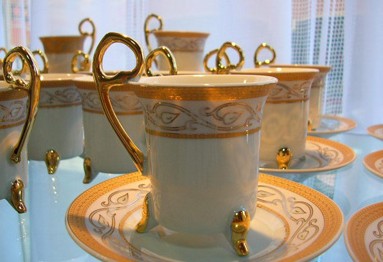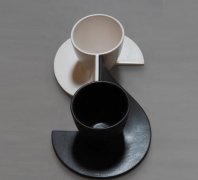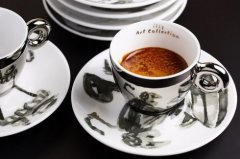The selection and use of coffee cups pay attention to the selection principles of coffee cups.

Principles for selecting coffee cups:
The color of the coffee liquid is amber and clear. It is best to choose a coffee cup with a white inside.
Pottery cups are suitable for coffee with deep copy and strong flavor.
Porcelain cups are suitable for coffee with a lighter taste.
Small coffee cups below 100CC are usually used to drink Italian coffee.
Coffee with a higher proportion of milk (latte, French milk coffee) is more likely to use a mug without a cup holder.
In addition to the appearance of the cup, we should also pay attention to whether it is convenient or not, and it is appropriate to choose the lighter one under the same quality (lighter cups, the texture is relatively dense, and it is not easy to make coffee dirt adhere to the cup noodles).
TIPS:
1. Warm the cup. Once the freshly baked boiling coffee is poured into a cold cup, the temperature suddenly drops and the aroma will be greatly reduced.
2. Bone porcelain archives (in the process of making, an appropriate amount of animal bones are added to the raw materials, which can slow down the decrease of coffee temperature) 25% bone powder and 75% high-grade porcelain clay are mixed.
Features: light texture (weight), strong light transmittance, soft color, high density (fragile, easy to clean) high temperature resistance (good thermal insulation)
Distinguish: the color turns yellow in the light, and there is a clear metal sound when striking.
If you want to make good coffee, a coffee cup is the mood of tasting good coffee.
A wide variety of coffee cups, is a sea of mood, you can listen to the sound of the waves of your heart.
Some people say that a cup of coffee foster a cup of mood, and a wide variety of coffee cups, like a sea of mood, ups and downs of people's various emotions.
How many cups do you have? Have you ever listened to the fluctuation of your heart while drinking warm coffee in a person's night? From these warm coffee cups, what else can you read except the mood of coffee?
The dependence complex of coffee VS cup size
In many cases, the intensity of a cup of coffee can be roughly judged from the size of the coffee cup.
The sizes of coffee cups are generally divided into three types:
* small coffee cups below 100CC-mostly used to hold strong and scalding espresso or individual coffee, such as Espresso, which is only about 50CC, although it can be drunk almost in one sip, the lingering mellow aftertaste and the temperature that seems to be warm forever can most warm the mood and stomach. The Cappuccino with milk foam has a slightly larger capacity than Espresso. The wide mouth of the cup can show the rich and beautiful foam.
* ordinary coffee cups around 200CC-the most common coffee cups, light American coffee mostly choose such cups, there is enough room for self-preparation, add cream and sugar.
* mugs above 300CC or milk coffee cups for French Ole-Coffee with a lot of milk, such as lattes, American mochas, multi-use mugs, is enough to contain its sweet and diverse taste. The romantic French, on the other hand, are used to using a large bowl of milk coffee (Ole coffee) to render a mood of joy that lasts for a whole morning.
There are still traces to judge the difference between the teacup and the coffee cup from the shape and size.
Usually, in order to retain the rich aroma of coffee and reduce temperature evaporation, the mouth of the coffee cup is narrower and the cup body is thicker. On the other hand, most of the black tea cups have a wide mouth and high light transmittance to reflect the clear and transparent brown color.
Pottery and porcelain, the elegant and elegant dialogue of sincere VS
The simplicity of pottery and the roundness of porcelain each tell different coffee comments. Some people like to use pottery cups with rich texture, dressed with masculine and strong deep-roasted coffee, but most people still use porcelain cups to explain the meticulous aroma of coffee.
Among them, the bone porcelain made of high-grade porcelain clay and mixed animal bone powder has light texture, soft color and high thermal insulation, which can best retain the warm memory of coffee.
Put the coffee in a cup with the right temperature.
Warm mood, of course, should be filled with a warm cup.
Warming the cup, although it is only a simple step, is an indispensable key to preserving the aroma of coffee. Because, just out of the boiling coffee, once poured into the cold cup, the temperature suddenly dropped, the flavor will be greatly reduced.
In your own warm cup, the easiest way is to flush it directly into the hot water, or put it in the bowl dryer to warm it up in advance. If you entertain a table at the same time, you can boil a pot of water and soak all the cups together.
Before tasting the coffee, don't forget to warm a cup with the right heat and completely seal all the flavors of the coffee.
Exquisite archives of bone porcelain
* ingredients-made of 25% bone powder and 75% high-grade porcelain clay. * characteristics-light texture (weight), strong light transmittance, soft color and high density (fragile, easy to clean), high temperature resistance (good thermal insulation).
* the way to judge when choosing-yellowing in the light and a crisp metal sound when tapping.
* maintenance code-it is best to wash it by hand and use the dishwasher only with fewer users. The PH value of the detergent must be between 11 and 11.5. the water temperature should not exceed 70 ℃ when washing in the dishwasher and 80 ℃ when washing with clean water. be careful not to soak the hot cup directly in cold water so as not to change the temperature rapidly.
Important Notice :
前街咖啡 FrontStreet Coffee has moved to new addredd:
FrontStreet Coffee Address: 315,Donghua East Road,GuangZhou
Tel:020 38364473
- Prev

K OUAH coffee cup coaster and coffee cup are integrated
K OUAH coffee cup (bright white) coaster and coffee cup are integrated, creating a natural handle for you, coffee lovers, the mind is so simple and delicate!
- Next

How to select and maintain coffee cup size
Coffee cup size some people say that the intensity of a cup of coffee can be judged by the size of the coffee cup. In order to keep the coffee mellow and slow down the temperature drop, coffee cups are generally thick. According to the size, coffee cups can be divided into three types: small coffee cups with less than 100 milliliters: mostly used to hold strong and scalding espresso or individual coffee. If you want to be big,
Related
- What is the Philharmonic pressure? How to use Philharmonic pressure to make delicious coffee
- Why does a hand grinder have more fine powder than an electric grinder?
- In addition to the hot mom, what is the difference between the versions of EK43 | ditting and Mahdi ek43?
- What kind of equipment do you need to make coffee by hand? Introduction to novice starter cooking equipment tools
- Espresso needs to be ground how thick and thin scale entry Italian Coffee Machine Bean Grinder investigation and Grinding course
- How much does it cost to open a small private cafe? How much does it cost to learn coffee? How to operate it?
- The difference between the flavor characteristics of hand-brewed coffee and coffee maker is hand-brewed coffee really better than coffee maker? Can I use a coffee machine to make coffee beans by hand?
- The difference between 01 and 02 of hario v60 filter cup what is the difference between 01 and 02 filter cup opening and cooking flavor
- What's the difference between the smart cup and the French kettle? Which is better, the French kettle or the Smart Cup?
- What's the difference between a smart cup and a V60 filter cup? The difference between the taste of smart cup and hand-brewed coffee

